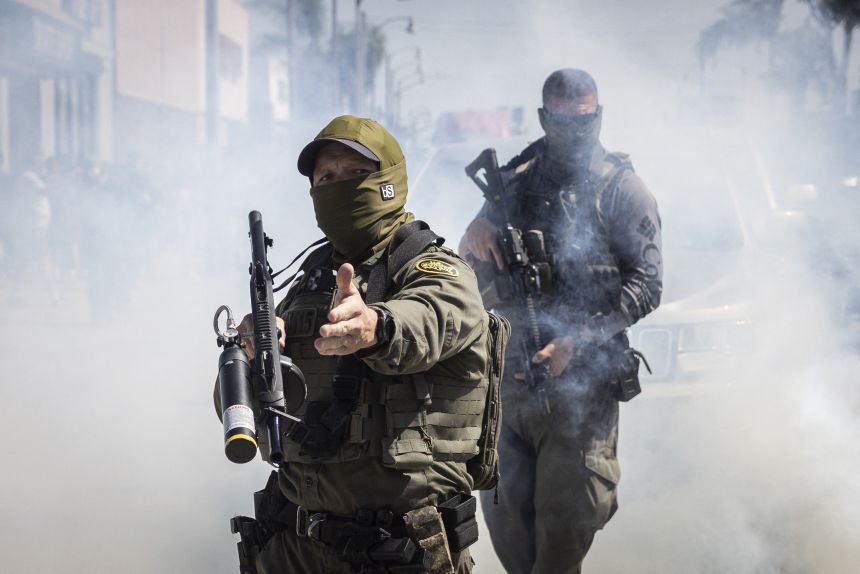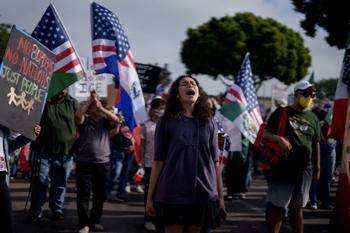Court Upholds Ban on Sweeping Immigration Raids in Southern California Amid Racial Profiling Concerns
Federal Appeals Court Rejects Government Push to Resume Broad Immigration Arrests
In a significant legal development, a federal appeals court has upheld a temporary restraining order that bars the Trump administration from carrying out wide-ranging immigration enforcement operations in Southern California. The decision came late Friday evening, reinforcing protections against what immigrant advocacy groups describe as racially motivated arrests targeting Latino communities.
The Legal Showdown
The case centers on a July 12 order issued by U.S. District Judge Maame E. Frimpong, which temporarily blocked federal agents from conducting immigration stops based solely on a person’s appearance, language, or location. The Trump administration swiftly challenged the ruling, requesting the Ninth U.S. Circuit Court of Appeals to reverse the order. A three-judge panel heard arguments on Monday, but ultimately decided to keep the block in place.
During the hearing, federal attorneys contended that the lower court's restrictions hinder their ability to enforce immigration laws. They argued the timing of the lawsuit, filed just before the July 4 holiday, limited their capacity to gather evidence and respond effectively in court.
Mounting Evidence of Constitutional Violations
In her initial order, Judge Frimpong pointed to what she described as a “mountain of evidence” indicating that federal immigration enforcement had veered into unconstitutional territory. The government, she ruled, cannot rely solely on factors such as race or ethnicity, speaking a certain language or with an accent, being present at specific locations like car washes or tow yards, or engaging in particular occupations to justify detaining individuals.
These practices, she emphasized, fail to meet the legal threshold of “reasonable suspicion” and risk turning lawful residents and citizens into targets solely because of their identity or surroundings.
Real-Life Impact
Among the plaintiffs challenging the government’s actions is Brian Gavidia, a U.S. citizen and Los Angeles resident. A now-viral video shows him being forcefully detained by federal agents outside a tow yard on June 13. In the footage, Gavidia can be heard yelling, “I was born here in the states, East LA bro!” as officers seize him.
His story underscores the wider concerns raised by advocacy groups—that the administration’s approach to immigration enforcement in Southern California has resulted in sweeping arrests that ignore legal status and constitutional protections.
The Government’s Defense
Government attorney Jacob Roth argued that the order was overly broad and legally ambiguous. He maintained that the government does not have a policy of stopping individuals without cause and that the cited factors—race, language, location, and occupation—can legally be considered when forming reasonable suspicion.
“It’s a very serious thing to say that multiple federal government agencies have a policy of violating the Constitution,” Roth stated, pushing back against the accusations.
He also insisted that the restraining order restricted the government from performing necessary enforcement duties and left unclear what tactics were permissible under the law.
Judges Push Back
The appellate panel showed little sympathy for the government's position. Judge Jennifer Sung pressed federal lawyers on whether relying solely on such generalized factors could legally justify detaining someone.
Sung pointed out that in a diverse city like Los Angeles—where Latinos make up nearly half the population—these characteristics are far too broad to distinguish between individuals who are undocumented and those with legal status.
“No one has suggested that you cannot consider these factors at all,” she said. “But using them alone doesn’t meet the standard of reasonable suspicion.”
She also questioned the government's resistance to the order, asking, “What is the harm to being told not to do something that you claim you’re already not doing?”
A Legal Precedent in a Heated Landscape
This decision marks another chapter in the ongoing legal and political conflict surrounding immigration enforcement in the U.S. Southern California has long been a flashpoint, with protests erupting over federal raids and the deployment of military personnel in response to rising tensions.
Federal agents have in recent months conducted immigration arrests at locations such as Home Depot parking lots, car washes, bus stops, and farms—frequenting areas where many long-time undocumented residents work and live.
With the court’s decision to maintain the temporary block, immigrant communities and advocacy groups have earned a temporary reprieve. Meanwhile, the legal battle is expected to continue, with the government likely to pursue further appeals or seek a narrower interpretation of the order.
As the case moves forward, it continues to highlight deep divisions over immigration policy, civil liberties, and the role of federal enforcement in multicultural communities across the United States.


COMMENTS (0)
Sign in to join the conversation
LOGIN TO COMMENT